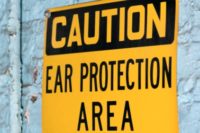Here are three uncommon causes of hearing loss, according to hearmichigan.com:
Low-frequency sounds: Things you can't hear can still do damage. A new study from Ludwig Maximilian University in Munich, Germany revealed that listening to 90 seconds of low-frequency sounds can change the way your inner ear works for minutes after the noise ceases.
Humans register sounds between 20 and 20,000 Hz, and the study had volunteers sit inside soundproof booths while sounds at 30 Hz (above 20 Hz but still rather inaudible) played. Then they analyzed the volunteers' spontaneous otoacoustic emissions (SOAEs), which are faint whistling sounds from the ear. For those in the study, the SOAEs oscillated and fluctuated. While this isn't necessarily indicative of long-term hearing loss, it shows the ear is prone to damage for exposure to these sounds. It’s possible long period of times with these sounds could have a permanent effect.
Smoking: Smokers are directly exposed to a host of chemicals, one of those being cotinine. The CDC has identified cotinine as having the potential for increased risk for middle ear (portion of the ear internal to eardrum and external to oval window) problems. And nicotine effectively shrinks blood vessels, which affects blood flow to the inner ear. The lack of flow can cause the cochlea to suffocate, resulting in hearing loss.
Medication: Prescription or over-the-counter drugs can contribute to hearing loss, including ibuprofen and aspirin. These drugs have ototoxic chemicals in them, which are harmful to the ear. Taking them for two or more days a week, according to American Journal of Epidemiology, can reduce blood flow to the cochlea.



